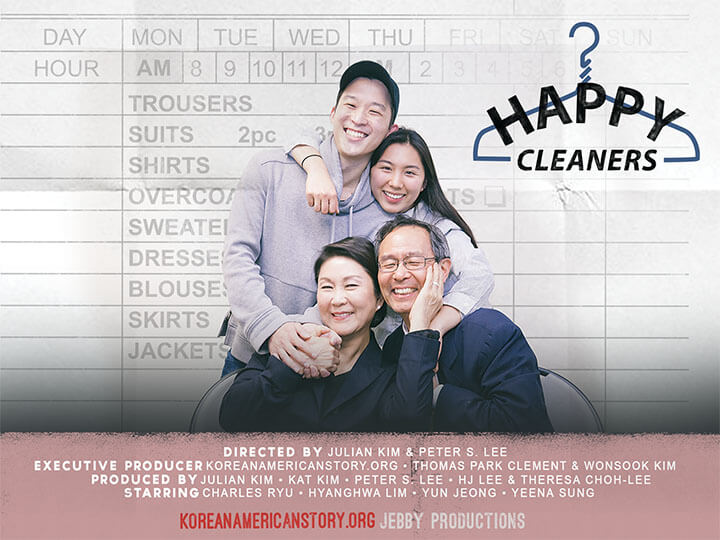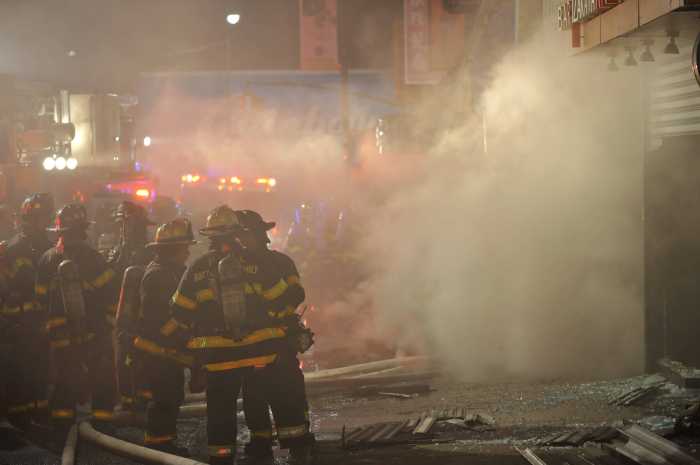Two Flushing natives are celebrating the release of their first feature film “Happy Cleaners,” which is making its Lunar New Year debut on digital streaming platforms this weekend.
After making a 2019 film festival debut and receiving accolades at the Los Angeles Asian Pacific Film Festival and the Center for Asian American Media’s CAAMFest, Julian Kim and Peter S. Lee were excited that their film is finally available to the general public.
As of Feb. 12, the film will be available on Amazon, iTunes Apple TV and Google Play. On Feb. 26, one of the film’s executive producers KoreanAmericanStory.org will present a live-streamed event with the directors, producers and main cast members. More information on that event will be available on https://www.facebook.com/HappyCleanersFilm/.
The film tells the story of the Korean American Choi family and delves into the themes of immigrant survival and the value of family. Mr. and Mrs. Choi’s Flushing dry cleaning business Happy Cleaners is in danger of closing when a new landlord takes over. On top of their challenges, their children Hyunny and Kevin struggle with the pressure of meeting their parents’ high hopes while trying to forge their own life paths.
As indie filmmakers, the duo encountered funding challenges to get their movie off the ground but found the support of KoreanAmericanStory.org in the process. The nonprofit stepped in as one of the film’s executive producers with the mission to “capture, preserve and share stories of the Korean-American experience.”
Prior to creating “Happy Cleaners,” the pair had created a handful of short films as part of their Flushing Web Series, which told stories of the neighborhood where they grew up. While they were pitching the series, they met people from the nonprofit who expressed interest in helping them to create a feature film.
“They were totally on board. They helped us fundraise to help us get through production,” Lee said.
The pair said that a typical film’s life cycle ranges from about six months to a year, but the onset COVID also brought about a new set of challenges with getting the movie out.
“I think a lot of films that were sort of coming out in 2019, they all had the same roadblocks that we did,” Lee said. “So it was a little late in the release but I think we’re thankful that it’s still coming out. Very often, a lot of independent films can just have nowhere else to go after festivals, so we’re thankful for the opportunity to be able to share [it].”
FLUSHING
Both Kim and Lee grew up in Flushing, which became a central part of “Happy Cleaners.” But the neighborhood’s importance was not always evident to the filmmakers.
“Flushing as a neighborhood didn’t mean much, to be honest,” Kim said. “When we first started off making the [Flushing Web Series,] we didn’t think much about it. We just thought, hey with the neighborhood, with the setting, let’s see if we can find stories here.”
Kim said that they were “surprised” at the Flushing stories they were able to find and cultivate during the filmmaking process. The diverse and “colorful” neighborhood eventually became a character itself in “Happy Cleaners.”
“We grew up in Flushing but we never give attention to it, so that’s kind of why we started this. By doing that, we were quite surprised at the stories we were taking in, the kind of stories that Flushing created and how it shaped us to be a New Yorker, a Queens native and a Flushing-born Korean American,” Kim said.
Like many who grew up in Flushing, Lee said that they experienced a love/hate relationship with it but recognized that their upbringing shaped their unique experience.
“That experience shaped how we view and interact with the world, so you have to give credit to that,” Lee said. “Also, there was certainly a lot of beauty to it. Flushing is unique in the way that there’s nowhere else like it. I think that this was a place with a wealth of stories. These experiences are not just uniquely Julian’s and mine but it’s sort of the collective experience that many of us who grew up in that neighborhood have experienced. So all of that is what Flushing means to the film and to us.”
A CATHARTIC PROCESS
While creating “Happy Cleaners” Lee and Kim described the process as a “therapeutic and cathartic” experience. They struggled with their identities growing up as Korean Americans and eventually started talking with and documenting the stories of the friends they grew up with and other people from the neighborhood.
“They had similar struggles,” Kim said. “I think during that process, we kinda connected and we just saw how important it was to truly dive into this story and tell it as authentically as possible.”
Through the conversations they had, the pair learned a lot about themselves while also gaining more insight into the differences they had with their parents.
“Generational differences, cultural differences and also just the language barriers,” Kim said. Also coming to understand more as first generation immigrants who come to this foreign country and try to make ends meet for their kids. I think writing and working on all that and making the film really widened our appreciation for that. That was like a healing process that we really cherished.”
Although “Happy Cleaners” tells the story of a Korean-American family, Kim and Lee said that the movie’s themes are universal to the human experience. But they aimed to tell the story in a way that they had rarely seen in other films.
“I think what makes it unique is the fact that it’s a tale that happened in Flushing to a working-class, immigrant family and we didn’t hold back,” Lee said. “We were very personal and very unapologetic about what we were writing. Because it was so personal, it became very universal [and] it just made it so relatable to people. We haven’t seen it packaged this way because a thing about these themes is nobody owns them, they’re very universal. But I think it’s about how it’s been presented. Part of the motivation behind wanting to create stories like this is because there’s not enough of our [Asian-Americans] stories out there and we just wanted to unapologetically exist.”
Watch the trailer for the film.
This story first appeared on our sister publication qns.com.































